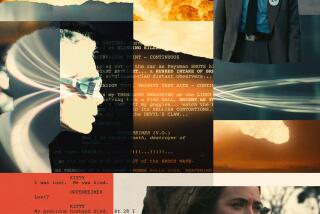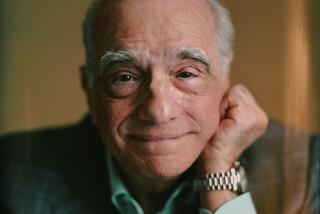Documentary examines George Harrison
When Martin Scorsese and Olivia Harrison first sat down about five years ago to strategize about a documentary on the life of George Harrison, both quickly zeroed in on a letter the young Beatle wrote to his family at the height of Beatlemania.
“It was a letter George had written when he was not more than 22,” Harrison said of the man to whom she was married for 23 years before his death from cancer a decade ago. “It was in 1965, and the Beatles would have been really cresting at that point. He was writing home and told his family, ‘I know that this isn’t it. I knew I was going to be famous, but now I know I can reach the real top of what man can achieve, which is self-realization.’ He knew then that [material reward] wasn’t it.”
That letter figures into a pivotal moment in Scorsese’s film, “George Harrison: Living in the Material World” (taken from the title of Harrison’s 1973 album), which premieres on HBO over two nights Wednesday and Thursday to accommodate its 31/2-hour length.
In the scene, George says how lucky the Beatles were to acquire so many of the material goods early on that most people spend their entire lives yearning for, because they learned relatively young how hollow such things ultimately ring.
Olivia Harrison gave Scorsese and his team virtual carte blanche access to home movies, family photos, audio recordings and other items from her husband’s estate for use in the film, which paints a richly detailed and unvarnished picture of the man initially pigeonholed as “the quiet Beatle.”
A more accurate sobriquet might have been “the spiritual Beatle” to reflect the inward quest that seemed to capture Harrison early in a life about which he once famously said that his biggest break had been getting into the Beatles; his second biggest, getting out.
In talking about the film, Olivia Harrison makes no bones about how emotional it’s been for her to see the many aspects of her husband’s life translated to the screen.
“I thought I had this clear vision of what this story would look like on screen, but it’s nothing like how I imagined it would be,” she said, “even though it’s accurate and honest and truthful.”
Even about uncomfortable topics such as Harrison’s 1974 solo tour that was savaged by many critics as well as its references to affairs he had after he married the former Olivia Arias, whom he met in 1974 when she was working in the L.A. offices of his Dark Horse Records label.
“Nobody asked me to bring up that subject,” she said, “it just came up. It was really about being with someone who’s in that position. I’m certainly not the only one who’s been with somebody who’s charismatic. It’s a big diversion.”
It’s also just a tiny part of the overall story, which begins with Harrison as a fairly happy child, born into a large Liverpool family amid World War II. It follows his ride to the pinnacle of pop culture as a member of the most popular and creatively influential band in the world, his exit when the group disbanded in 1970 and on through his subsequent musical, cinematic, spiritual and philanthropic endeavors, which Scorsese covers, rough edges and all.
“Left to me, [the documentary] would have had no edges,” Olivia Harrison said. “I really had to let go of that. Marty crafted it that way, and Dhani [her son with George] was also very helpful. He told me, ‘You have to have the good and the bad, the black and the white; you can’t just have it all nice.’ ...It took a lot of getting used to. I had to see it several times before I could look at it and not wince. It is brutally honest.”
It’s also exceedingly admiring of a singer, songwriter and instrumentalist who for much of his career lived in the estimable shadows of John Lennon and Paul McCartney.
In one of the most charming moments of the film, Harrison, the youngest Beatle, talks about writing his first song, “Don’t Bother Me,” from the group’s 1963 album “With the Beatles.” He summed it up as “an exercise. It’s not a particularly great song.” He simply felt at the time that “If John and Paul could write, then anyone can.... [It] showed me I just had to keep on writing and someday I’ll write something good.”
Scorsese also addresses Harrison’s strong attraction to the classical music of India, which he explored extensively through his friendship with sitar master Ravi Shankar; the original rock music all-star benefit Concert for Bangla Desh that grew out of that relationship; his exploits in filmmaking through the Handmade Films company; and his latter-day role in the Traveling Wilburys supergroup. Harrison died on Nov. 29, 2001, at age 58.
Harrison’s legacy will be explored further in an exhibition opening Oct. 11 at the Grammy Museum in Los Angeles, one that shares the title with Scorsese’s film and Olivia Harrison’s companion book.
Museum executive director Robert Santelli said the exhibition will underscore Harrison’s sometimes underappreciated status as one of rock’s greatest guitarists and his deeply felt spirituality.
“I see him as one of rock’s first renaissance men,” he said. “He was authentically interested in spiritualism and Eastern philosophy; he was experimenting with electronic sounds in the ‘60s. He did the ‘Electronic Sound’ album, which was the first Beatles solo album, but we forget that. We know him for ‘All Things Must Pass’ but don’t know he was a great photographer. We know him for his interest in films for his work with Monty Python and his Handmade Films, but he also was a great gardener who was deeply interested in the natural world.”
Olivia Harrison has loaned guitars, clothing Harrison wore onstage while touring with the Beatles and solo, original lyric sheets, letters, photos and other items for the display, billed as the first major exhibition focusing on Harrison as a Beatle and his life away from the group.
“It just so happened that everything was completed this year, which happens to be the 10th year since George died,” she said from the estate in Oxfordshire, England, that George bought in 1969, where she was busy packing up items to be sent to the Grammy Museum.
“I’m a little nervous about it,” Olivia said. “Sitting by the front door right now is a huge road box full of guitars that are going out tomorrow. Letting these things out — it’s a big deal.
“Then again,” she quickly added, a note of good-humored resignation creeping in over the worry, “George would say, ‘It’s only stuff.’”
More to Read
The biggest entertainment stories
Get our big stories about Hollywood, film, television, music, arts, culture and more right in your inbox as soon as they publish.
You may occasionally receive promotional content from the Los Angeles Times.






